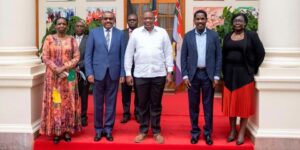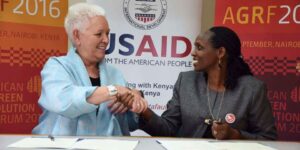Born in Rwanda, raised in Uganda as a refugee, Agnes Kalibata is changing African farming.
It is daunting enough to head an iconic organisation supported by big-name international funders.
As if that is not demanding enough, this is an organisation founded by the legendary Kofi Annan, the United Nations Secretary General from 1997 to 2006. The Ghanaian diplomat died in August 2018 but remains one of the most revered Africans on the global stage with a legacy to match.
Tall order as it may seem, one woman has been at the helm of this organisation since September 2014. She is Dr Agnes Kalibata, an agricultural scientist from Rwanda who grew up in Uganda as a refugee then later returned to Rwanda to be the country’s Agriculture and Animal Resources minister in 2008, where she drew global acclaim for the radical improvement her ministry brought to small farmers in Rwanda.
That contributed to her being picked as the president of the Alliance for a Green Revolution in Africa (Agra), an organisation with a presence in 11 African countries and whose headquarters are in Nairobi. The alliance aims at inclusive agricultural transformation in Africa by increasing incomes and improving food security for millions across the continent.
As she readied herself for an interview with us at her Nairobi office on a Tuesday afternoon, she offered us sweet bananas she had carried to take for breakfast but her busy schedule somehow couldn’t allow her. She farms them in her Nairobi home.
“And this is a type I’m sure you have not tasted before,” she said.
They sure had a unique taste somewhere close to a glass of milk with two teaspoonfuls of sugar added and with the solidity of a fresh loaf of bread that had been compressed.
The sweet bananas were perhaps a representation of what Dr Kalibata is passionate about: improved breeds that can withstand the pressures of the environment and deliver bumper harvest that can fill tummies and part of it be sold to fill pockets.
There were many takeaways from the interview in which Dr Kalibata came out as a deeply knowledgeable scientist with a distinct sense of humour.
“I take pride in ensuring that we are a well-run African institution.”
Agra employs more than 200 staff from at least 27 countries; the vast majority being from Africa. It has a list of partners across the globe, with some of them pumping in huge amounts of money to be used in various ways. These include the United Nations Development Programme, United Nations Environment Programme, USaid, UKAid, German Development Bank, Bill and Melinda Gates Foundation, Rockefeller Foundation, MasterCard Foundation, among many others.

“Our recent evaluation highlighted our success facilitating 42 policy reforms, supporting 11 national flagships, and mobilising $1.4 billion (Sh89.3 billion) investment into the (agriculture) sector,” says Agra’s Life of Strategy Report covering 2017 to 2022.
Though Dr Kalibata says that Agra handles significant sums of money and one of her roles as president is to ensure accountability.
“My job is to ensure that the institution is well-run, and that is extremely important,” she said. “I know that there is this thing out there where they say Africa doesn’t have capacity.”
She added: “I also ensure that we give value to our funders. Our job is to ensure that once people invest in Agra for the work that we do, we show them the value in terms of good custodianship of their money. There is a whole lot of belief (about) Africans — corruption and stuff like that. We can actually demonstrate that we take care of people’s money; that an African institution can take care of people’s money.”
The Agra strategy report says that in its first 10 years (it was founded in 2006), the organisation trained 680 PhD and Master’s graduates in crop breeding, crop science and agronomy. It also facilitated the release of 562 new seed varieties and supported the production of nearly 600,000 metric tonnes of seed. It also trained 5.3 million farmers on soil fertility management practices.
In the last five years, it says, it has been focusing on working with governments and widening its network of partnerships.
“As a result of our efforts, a majority of our farmers have adopted improved practices, with 75 per cent of farmers adopting fertiliser use, 48 per cent adopting improved seed and 60 percent adopting post-harvest practices. We are starting to see these outcomes translate into increased yields at the farm level,” the report notes.
Dr Kalibata is happy to be the captain. Supervising the management team she heads is a 14-member board of directors that is chaired by former Ethiopian Prime Minister Hailemariam Dessalegn.
“We’ve been very deliberate to ensure that members of our board, not just the chair, are passionate about how this continent can get itself out of poverty, are passionate about the role of the agriculture sector and are influential enough to help us move things forward,” said Dr Kalibata.
Dr Annan, the United Nations secretary-general for almost 10 years, was the founding Agra chair. Among the members of the current board is former Tanzania President Jakaya Kikwete.

“You will see that some of the members of our board are former heads of State because they understand some of the things that need to be done,” said Dr Kalibata.
“The thing that fascinated me the most is that there are insects that regrow legs.”
How does a girl being raised in a foreign land choose to study insects and biochemistry at Makerere University? Well, one of the things that made her intrigued about entomology, the study of insects, is the fact that some of them regrow legs when they are cut off. She wanted to know what magic goes into this.
“I was really interested in understanding it,” she said. “But that’s another story.”
Her father used to teach in Rwanda before they fled northwards due to war.
“My family ended up in Uganda because of colonial challenges. You remember the fight for independence and all that? At that time in Rwanda, there was a war. My family and a whole lot of people were forced to flee the country. Others fled to Congo; others to Kenya; others to Burundi. Rwandans got scattered all over because of that war,”said Dr Kalibata.
“I went back after my PhD, after over 35 years of living in exile,” she said.
Her father being a teacher ensured she got an education to the highest level. Most of her female peers didn’t go very far and it hurts her.
“I wasn’t the brightest child in my class. And I always think of those girls who I think were bright but couldn’t progress (because of poverty). I was lucky because my dad was a teacher. And he was going to stop at nothing to ensure that I’d get an education,” said Dr Kalibata. “When I was leaving my rural village and going to secondary school, the drop-off at that stage was amazing.”
After her first degree at Makerere, she returned to the same institution for a Master’s in agriculture. She would later head to the University of Massachusetts Amherst in America for her PhD in entomology.

She says that besides insects like bees being key to the survival of humans, there is a lot to learn from the six-legged creatures.
“Our understanding of genes and genetics is so much greater (because of insects); and our understanding of how we can improve medicine is so much better,” she said.
“Another reason why I thought entomology was a good area, especially as I was doing my PhD, is that it’s also an area that’s not just in agriculture. It’s also medical. There is also criminal entomology,” added Dr Kalibata. “Who knew that you could tell the cause of death (of a person) by studying insects?”
After her studies, she was involved in university research before Rwanda’s President Paul Kagame appointed her minister. She is credited for ensuring almost half of Rwandese farmers rose out of poverty. Among the initiatives she implemented is the famed cow-sharing programme.
“I did that job for about seven years and while in that role, I learnt a lot around policy and how policy-making is a make-or-break,” she said. “I learnt that it’s actually possible to use agriculture to fight poverty.”
Good weather
“Nairobi is a beautiful place with good weather.”
Having lived in Nairobi for the last eight years, Dr Kalibata admits that she is in love with Kenya’s capital. She is even happier that it is nowadays easier to take her children to school and to reach the Jomo Kenyatta International Airport.
“I love Nairobi,” she said. “The people are great; the culture is good. It has a vibrant international community; it has a vibrant local community. It’s really a decent place. Most people love living here, so you get to meet all sorts of people.”
She went on: “Nairobi is interesting; it has everything. It has the African part and the Western part, all in one. So, it’s not like you’re missing anything. You find anything in one place. You can be purely African in Nairobi and you can be purely whoever you want. So, it’s a microcosm of things that make it really interesting to live in as a city. And the traffic has significantly improved. As long as getting to school and the airport is easy, life is easy,” she said, laughing.
Clearly, if she can farm sweet bananas, Nairobi is as good as it can get.
“I’m one of those pretty late mums.”
With a chuckle, Dr Kalibata noted: “I sometimes wonder about my choices.”
She said that as she discussed her life as a mother. She has two fraternal twins – a boy and a girl – who are 10 years old.
She admits that she got into motherhood late in her life, noting that she should have found a way of striking the balance earlier.
“It’s very painful, wondering whether you’ll be able to have children, whether you’ve sacrificed too much when it comes to children. It’s something that every woman who has a career worries about. And I just keep saying that there must be a better way. There must be a better balance. There must be a better balance that saves you the pain; that allows you to get your career in good time and saves you the pain of having to look for children when you’re older,” she said.
On the left of her desk at her office are writings by her children declaring that she is the best mum in the world.
The children have had to keep up with her busy travel schedule. And meetings. And her bid to strike the perfect work-life balance.
Fresh air
“Yesterday I told them, ‘You know, there is a meeting next week. I’m supposed to be in…’ They were like, ‘Again? You just came from Washington and you’re going to another meeting?’” said Dr Kalibata.
She noted that the children keep her in check. They also ensure that she at least takes a break once in a while to take them somewhere to take a breath of fresh air. Without that, leave for her means doing work that was waiting to be done elsewhere.
“You know, sometimes Africans don’t take leave. They go home to do other projects. I’m still waiting to see one African that actually takes leave. Because when you go home for leave, there are so many things that are waiting for you. So, you basically shift. Sometimes I come back from leave more tired than when I left. Am I going to take a leave to go to the beach? Unlikely. But today, because I have young children, I’ll do it,” she said.
On the work-life balance, she noted: “(Work is) 7am-7pm really.”
“Once you put in 7 to 7 like in my case, you can afford three hours of sitting and having dinner with your children. You can afford to pretend that the world doesn’t exist. You know, in the morning it will be waiting for you but that ability to shut off when you’re entering your home is extremely important. Unfortunately, it also translates into the ability to shut off when you’re entering the office,” she added.
“The incentive has to be strong enough.”
Dr Kalibata believes that Africa’s youth are less enthusiastic about agriculture because of the meagre rewards. Because the continent imports billions worth of food annually, she notes, it means there is a huge demand that is not being addressed.
“We are importing $50 billion worth of food that we can produce. If you do a back-of-the-envelope calculation on how many jobs that is, basically those are the jobs we are losing that young people should be having here,” she said.
Biggest gap
“We need to make sure that the market is available, to make agriculture attractive. And I think that’s the biggest gap to date that we see. With a good market, people will invest in research, in improving the sector. In getting better yields. But the market has to pay,” she added.
To change that trend, Agra has been funding institutions that in the long run improve the market.
“Our job is to strengthen capacity, not to do things for people. We want to make sure these communities can actually do a better job when we are not there. So, we want to leave them in a better place. Because of that, we use grants and technical support. When we go out to a community and find that there is a private sector that is struggling, we find ways to support that private sector so that they can be better off at providing the services that they are providing,” said Dr Kalibata.
“Because we’re a small institution and we don’t have a whole lot of money, we focus on trying to be catalytic,” she added.
She went on: “Because of that place we have chosen of being a catalytic institution and again really trying to do our best while we can, my typical day is full of meetings internally, consulting with staff, externally, engaging with partners and also just trying to move things from what we have agreed on to do as a strategy.”
Side-by-side with incentive, she says, better seeds are transformational.
“Imagine if all farmers adopted improved seeds so that instead of 0.5 metric tonnes, they are producing five metric tonnes. Life will change for these farmers. My job is to focus on those farmers who are not adopting even simple technologies that are already available to us,” she said.
Credit: Source link